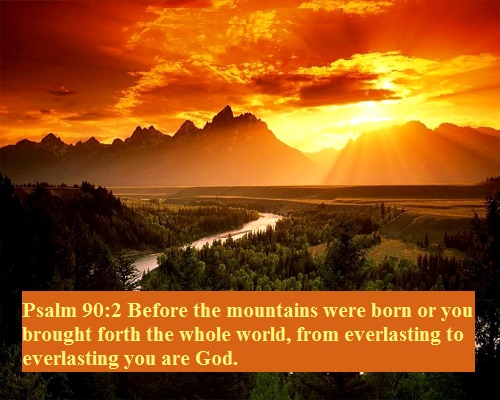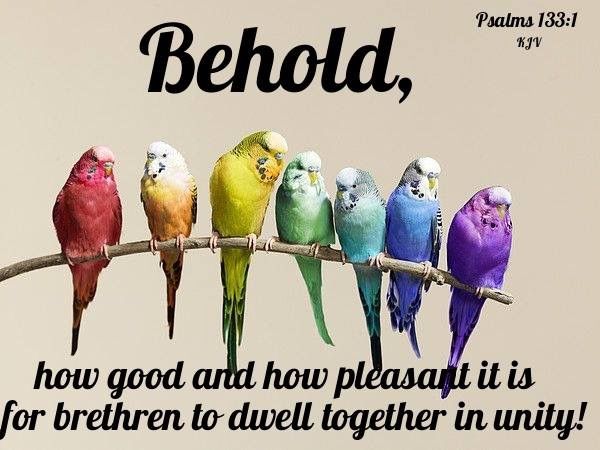Teachings from the Psalms - 3
Psalms 90, 104, 133, and 102
Teachings from the Psalms - 3
Psalms 90, 104, 133, and 102

I Introduction
II. Psalm 90 - read 1-6, 12 first; then, 16-17.
1 Lord, you have been our help, generation after generation.
2 Before the mountains were born, before you birthed the
earth and the inhabited world - from forever in the past to forever in the
future, you are God.
3 You return people to dust, saying, “Go back, humans,”
4 because in your perspective a thousand years are like yesterday past, like a short period during the night watch.
5 You sweep humans away like a dream, like grass that is renewed
in the morning.
6 True, in the morning it thrives,
renewed, but
come evening it withers, all dried up.
12 Teach us to number our days so we can have a wise heart.
16 Let your acts be seen by your
servants; let
your glory be seen by their children.
17 Let the kindness of the Lord our God
be over us. Make the work of our hands last. Make the
work of our hands last!
A. What does it mean to count our days? To what end?
(Doing so helps us acquire a heart of wisdom. It helps us be mindful of the limited time we have, which leads us to use our time well, beginning with the work and effort it takes to garner wisdom. When counting the days, we tend to be more conscientious of the time itself and, being aware of it and measuring it, we are inclined to be more accountable in our use of it.)
Thus, feeling more accountable and living true to the wisdom, we are led more and more to live in a manner pleasing to God, which in turn causes us to live well with others.By counting the days, further, we treasure them. In a way, life on earth is given some aspects of the eternal.)
B. In the second set of verses, we get an echo of an important lesson we learned last week. What meaning do you find here? What do we hope will be the impact of our deeds? For those of you who have read Ecclesiastes, how does the psalmist here challenge some of its main ideas?
Our actions are important reflections of our commitment to God. We hope they are reflections of the sweetness of God’s direction to us.
Further, we know that our actions have consequences for others. When we live in God’s ways, others take notice and, we hope, are drawn to service of God, too. This is especially important for those in our domain, our children as well as those with whom we work.
Even more important perhaps is the impact of what we do on the children in our world, and their children, and so forth.
We hope our work is “firmly found,” that is, as enduring as that which sustains buildings, even dynasties. Or, put another way, we hope our handiwork is like a fruitful tree, bearing sweetness from God well into the future.
In a sense, this psalm is an answer to the
sense of hopelessness that one may see in part of Kohelet (Ecclesiastes). Even
though our bodies die, our lives do matter. Living God-directed lives creates
joy, a richness of an eternal sort in the time we have, and enduring effects on
others and on our world, into the future.)
III. Psalm 104 - read 1-4 first; then, 9-12.
1 Let my whole being bless the Lord! Lord my God my God, how fantastic you are! You are clothed in glory and grandeur!
2 You wear light like a robe; you open the skies like a curtain.
3 You build your lofty house on the waters; you make the clouds your chariot, going around on the wings of the wind.
4 You make the winds your messengers; you make fire and flame your ministers.
9 You set a boundary they cannot cross so they’ll never again cover the earth.
10 You put gushing springs into dry riverbeds. They flow between the mountains,
11 providing water for every wild animal - the wild donkeys quench
their thirst.
12 Overhead, the birds in the sky make their home,
chirping loudly in the trees.
A. God is clad in light. What does that mean?
(While God is invisible, God is clad in glory and is overwhelmingly present. As light denotes, God is enlightened, beckoning, showing the way, true.
Note, by the way, all the verbs in these
verses. God is active, defining and shaping in the being and doing. This is
principally what we know of God and that part of the Divine that we can best
emulate.)
B. God walks on the winds and makes messengers of them. What does that mean?
(Wind, which is also invisible yet forceful, is
symbolic of spirit. The Hebrew word, ruach, suggests both. It’s reminiscent of
breath, the breath of life God breathed into us. Indeed these are among God’s
most precious messengers to us. We see this very idea at play in verses 29 and
30 in this psalm.)
C. What does the image of fire convey?
(Fire accompanied the people in the wilderness.
We have the feel of fire’s service to God and to us as ministers in that
respect. We also see the flame in other similar ways - the lights in the
Tabernacle and Temple, the fire of the offerings. Don’t festival candles
suggest the same?)
D. We see the image of water once again in the latter verses. What do we now see it means?
(Water supports life - both materially and
spiritually. This is one of the most common motifs in the psalms, indeed all of
sacred literature. We’ve seen it and discussed it often in both the Hebrew
Bible and the New Testament. It’s lovely to see how water supports all of God’s
creation - domesticated and wild, human and animal.)
E. What do you make of the animals, and the birds, specifically?
(We’re certainly reminded of the birds that nest in the Temple stones in an earlier psalm. We may think, too, of the choristers who sing in worship, in sacred space, with God. Since these images of birds are representative of us, we think of us in all these poetic descriptions of creatures that “make their homes” and “sing” in the glorious world that God has created.
For all this, we’re inclined in reading this
psalm to be grateful to God for enlightening us, sending messengers our way,
being near and available, and, of course, sustaining, protecting, and
nourishing us.)

IV. Psalm 133 - read the whole psalm.
1 Look at how good and pleasing it is when families live together as one!
2 It is like expensive oil poured over the head, running down onto the beard -
Aaron’s beard! - which extended over the collar of his robes.
3 It is like the dew on Mount Hermon streaming down onto the mountains of Zion, because it is there that the Lord has commanded the blessing: everlasting life.
A. Verse 1 is a key part of the liturgy in Jewish worship. What is its core meaning? What does it have to do with the objective of living near to God? Can you see the relationship of this idea to the commandments Jesus identifies as great? Discuss.
(God wants us to dwell with others in unity. When we do, I would suggest, it’s like we’re dwelling with God.
Let’s always remember the inter-relationship of the commandments Jesus cites as the great commandments. We love God, and we love our neighbors as ourselves. In that flow of love from us to God and God to us, from us to ourselves and us to our neighbors - God is present.
Here we see the idea of love - living with others
in unity - as reflective of the good and of God.)
B. When we read of the pouring oil and the falling dew, we should remember these images from our Bible study. What’s their significance to the main idea of this psalm.
(They speak of symbols of our love and service of God.
The oil pouring down brings to mind the anointment of priest and king, their initiation into service of God and people.
The dew is a manifestation of water from heaven on the earth. We just saw that idea in the last psalm we examined. We’re reminded of Moses’ teaching of dew and rain in his final oration as a way of talking about God’s teachings and how we can absorb them.
God calls us to service, and we serve out of love for God. God nourishes and directs us. We love our fellows and live with them in harmony. As the poetess Pamela Greenberg suggests, this is where God willed into existence the blessing of eternal life.
We should be seeing in this psalm, as well as
the previous two, a deep sense of what nearness to God really means.)
V. Read verses 12, 18, and 28 of Psalm 102
12 But you, Lord, rule forever! Your fame lasts from one generation to the next!
18 Let this be written down for the next generation so that people not yet created will praise the Lord:
28 Let your servants’ children live safe; let your servants’ descendants live secure in your presence.”
What’s the main idea of these verses? How do they inform our study of the importance in Psalms of the notion of nearness to God?
(1. Even a person who suffers greatly, perhaps feeling chastised by God, maybe dying, thinks and writes thoughts of God’s enduring sovereignty. Further, this person shows a respect, even reverence, for remembrance - a memory of God’s deeds, God’s miracles, God’s love, and God’s saving hand. It’s as if the simple acts of memory and recitation revive, or at least begin to revive, hope and to sustain the supplicant.
All of this is crucial to maintaining faith, hope in our restoration, and a sense of being favored with living in God’s presence.
This idea of “from generation to generation” gives our faith a firm place, that is, that it is lasting, and that regardless of our straying or separation in the past or even the now, there is hope of lasting presence and deliverance.
2. We see the psalmist recording these thoughts in the hope that memory is facilitated, deed is done, and the presence is felt, not only now, but, crucially, well into the future. The sense that God is forever and ever is comforting, especially in the assurance of abiding presence for each generation, ours and all that follow.
3. The idea that our children will be settled and their children will be established before You gives again an enduring and ongoing nature to the quality that fits underneath God’s eternal presence. There’s security that spans time in the presence.
The psalm flows from memory to recorded truth to faith of a continuing presence with the Eternal.)
VI. Takeaways –
What are the main one or two ideas that you will carry forward in life as a result of our study of Psalms?
Scripture taken from the Common English Bible®, CEB® Copyright © 2010, 2011 by Common English Bible.™ Used by permission. All rights reserved worldwide. The "CEB" and "Common English Bible" trademarks are registered in the United States Patent and Trademark Office by Common English Bible. Use of either trademark requires the permission of Common English Bible.